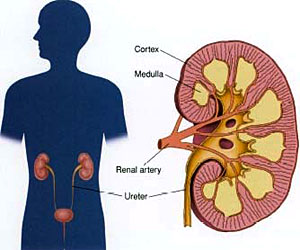Many types of kidney disorders have been identified so far. Different types of kidney diseases are caused due to different reasons and they show different signs and symptoms. The treatment method is also different for each type of disease. There are mainly two types of kidney disorders namely acute kidney disease and chronic kidney disease. While the acute kidney disease may develop all of a sudden, the chronic kidney disease develops over a long period of time. Identification of the exact type of kidney disorder increases the possibility of effective treatment to a large extent.
 Polycystic kidney disease (PKD) is considered one of the most common types of kidney disorders. In this type, many cysts (cavities) form in the kidney. While some of the cysts do not cause any progressive kidney failure, the other cysts are of the inherited type that may enlarge and slowly replace the mass of the kidney. There may be no symptom at all in this type of kidney disease.
Polycystic kidney disease (PKD) is considered one of the most common types of kidney disorders. In this type, many cysts (cavities) form in the kidney. While some of the cysts do not cause any progressive kidney failure, the other cysts are of the inherited type that may enlarge and slowly replace the mass of the kidney. There may be no symptom at all in this type of kidney disease.
Pyelonephritis is another common type of kidney disorder that refers to infection of the kidney. This is also known as urinary tract infection. Though it is usually caused by a bacterial infection, it can also result from viruses. However, the most common cause is an obstruction to urine flow. The obstruction may be found in the ureter (the tube connecting the kidney to the bladder) or to the outflow of urine from the bladder. Stones, swelling and scarring of the ureter, chronic infection and tumours may also cause the obstruction. Most cases of Pyelonephritis can be treated with medication. Kidney reflux is a type of kidney disorder. It refers to a condition where the urine in the bladder passes back up the ureter to the kidney, instead of going out through the urethra during the process of urination. In this type of kidney disorder, the muscles that usually close off the ureter to the bladder do not function normally. Kidney reflux may cause a kidney infection and this may result in back pain.
Another type of kidney disorder is renal acidosis. Here, the acid products that are not being properly excreted by the kidney accumulate in the blood. As a result, the acidity of the blood goes up and this stimulates the receptors in the brain to speed up the rate of breathing. This can also cause the patient feel shortness of breath and may speed up the heart rate so the pulse goes up. Mesangial proliferative glomerulonephritis is another type of kidney disease that can be there in the body for a long time, without any symptoms. However, the symptoms like high blood pressure, swelling and anemia may be found in some patients suffering from glomerulonephritis. The treatment therapies for this type of kidney disorder include diet, weight control, etc.
Nephritis is one of the common types of kidney disorders and is mainly caused due to inflammation in the kidney. Apart from inflammation, the other causes of nephritis include glomerulonephritis, autoimmune nephritis, lupus nephritis, nephropathy, gout, certain poisons, certain medicines, certain metabolic disorders, etc. The common symptoms of nephritis include reduced urine, blood in urine, edema, loin pain, etc. Nephropathy is also a type of kidney disease that is mainly caused due to non-inflammatory kidney condition. The symptoms of Nephropathy are quite similar to those of nephritis; however, the causes are different. There are different types of nephropathy that include toxin nephropathy, obstructive nephropathy, diabetic nephropathy, reflux nephropathy, IgA nephropathy, analgesic nephropathy, etc.
Haemangiomas are counted among the common types of kidney disorders. These are some tumours usually found on the skin and can occur in any organ or tissue in the body. They may cause haematuria (visible blood in the urine) when they are located in the kidney. Another common type of kidney disease is the parenchymal kidney disease. Here, the kidney is damaged and scarred and loses part of its ability to function. The diagnosis of this disease is usually done by ultrasound. Most of the parenchymal kidney diseases can be treated through alternative medicines.
Apart from the above mentioned types of kidney disorders, there are also a few rare types of diseases. These kidney disorders include Hyperfiltration, mild microalbuminuria, clinical albuminuria, advanced clinical nephropathy, chronic renal insufficiency, etc. However, most types of kidney diseases can be treated following various alternative medicinal methods, if detected at an early stage.
Source: indianetzone.com/41/types_kidney_disorders.htm
